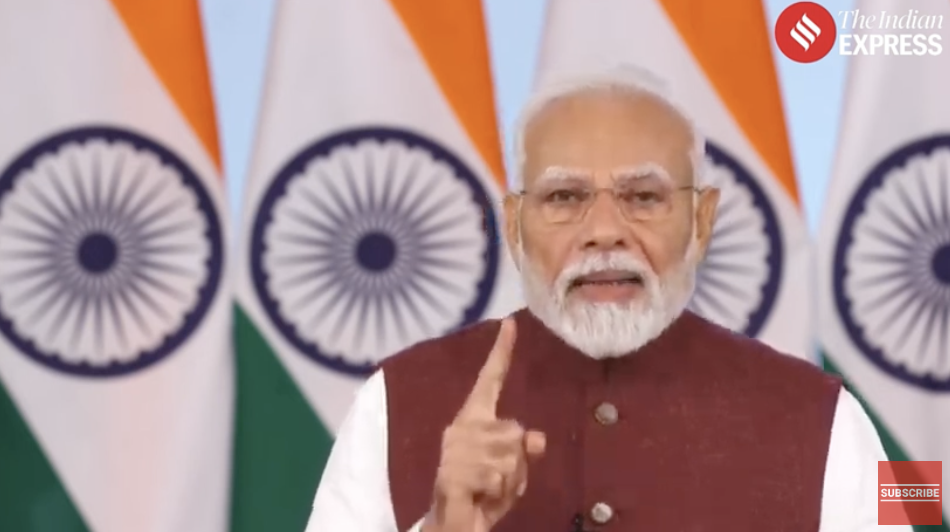
By Mayabhushan Nagvenkar / Outlook India
On June 15, Governor PS Sreedharan Pillai made a pitch for the promotion of Goa as a destination for spiritual tourism.
“Our cities, our beaches are beautiful, but villages are more beautiful than cities. There is a lot of importance to spiritual tourism, not confined to any religion. There is scope for spiritual tourism,” Pillai said, at the function where President of India Ram Nath Kovind laid the foundation stone for the construction of a new Raj Bhavan complex in North Goa.
On the same day, just some 30-odd kilometers away, a Hindu Rashtra Sansad (Hindu National Parliament), part of the Akhil Bharatiya Hindu Rashtra Adhiveshan held at the Ramnathi temple grounds in the temple town of Ponda, demanded the deletion of the words ‘secular’ and ‘socialist’ from the Indian Constitution.
The Adhiveshan, annually held in Goa is in its 10th edition, and according to its co-organisers, the Hindu Janajagruti Samiti, is attended by hundreds of representatives from Hindu organisations based out of the United States of America, United Kingdom, Hong Kong, Singapore, Fiji, Nepal and 26 Indian states.
Since June 10, the seven-day event has so far, served as a hub of discussions for most key bullet-points which account for Hindutva discourse in the country. The bullet-points include contentious issues like the Jyanvyapi mosque, Places of Worship Act, atrocities against Kashmiri Hindus, sound pollution caused by loudspeakers atop mosques, the hijab agitation, religious conversion, halal economics, etc.
Incidentally, Goa hosted the first edition of the Adhiveshan in 2012, the year, when the state voted the BJP under late Manohar Parrikar to a simple majority in the state assembly for the first time.
While the BJP has officially steered clear of the ‘Hindu’ event, one can trace overlapping elements in the proposals which echoed at the Adhiveshan and emerging government policies and ruling party rhetoric both in the state and at the Centre.
To cite an instance, Goa is embroiled in a debate over religious conversion following the arrest of a local Protestant pastor, who has been accused of luring targets to his flock with ‘incentives’. Chief Minister Pramod Sawant has commended the police for the arrest and has also hinted at tabling a new anti-conversion law in Goa to prevent “forced conversions”.
A suggestion to the effect was made at the Adhiveshan by former Central Bureau of Investigation (CBI) M. Nageshwar Rao, during a lecture.
“The issue of religious conversions exists at the national level. To stop this, Article 25 of the Constitution needs to be amended and the words ‘propagate religion’ removed from it. There should be no obstacles in following one’s own religion. Besides, the Goa Government must pass the requisite law in the assembly and send it to the central government,” Rao said on June 14.
Another speaker at the event, advocate Amrutesh NP from Karnataka, celebrated the economic boycott of Muslims at Hindu festive events in the southern state. “When you are fighting against an opponent, you have to cut all his financial links,” he said.
“After the hijab judgement, what happened. In all the temples, jatra (fair) is going on. All our Hindu communities and also temple communities, they have made one board (signage). Except Hindus, no market place is to be given to any other community. That is the starting point,” he said.
Amrutesh is also the national vice president of the Hindu Vidhidnya Parishad, a collective of “nationalist and devout” Hindu lawyers.
“When you cut their financial links, then only they will come to know how it is. In South Canara, Kodagu, Hassan and Udupi, all jatras they have boycotted this community to put (up) shops in Shimoga, Marikamba temple in Sirsi too, they have put a big banner. ‘We are not going to give tender to this community’. Yes, they have taken the correct stand. This is the reverse technology we have to use,” Amrutesh said, at the event which the Goa-based Sanatan Sanstha has assisted in organising.
Prashanth Sambargi, a businessman, who dabbles in Kannada films and was also cast as a participant in ‘Big Boss Kannada 8’ last year, also spoke about how love-jihad was “designed, conceptualised” in Bollywood.
“The biggest weapon that Bollywood has given is the solution of Love Jihad. Muslim men marrying Hindu women is designed, conceptualised in Bollywood. Shahrukh Khan married Gauri Khan, Amir Khan married Kiran Rao, Saif Ali Khan married Kareena Kapoor. The list is endless… This is not their personal choice. This is not love at first sight. This is not love in marriage or a marriage in heaven. This is a design to influence the youth of India,” Sambargi said.
Incidentally, a key Hindu organisation like the Rashtriya Swayamsevak Sangh or official representatives of any of the four Shankaracharya-run maths were not formally a part of the speaker’s list at the Adhiveshan.
So was the Adhiveshan in Goa, an exercise in mere fulmination by the fringe?
At a time when the ruling political party, under diplomatic pressure, can brand its own official spokesperson as a “fringe element”, the lines between mainstream and fringe, may well have blurred beyond recognition.
This article first appeared on outlookindia.com






